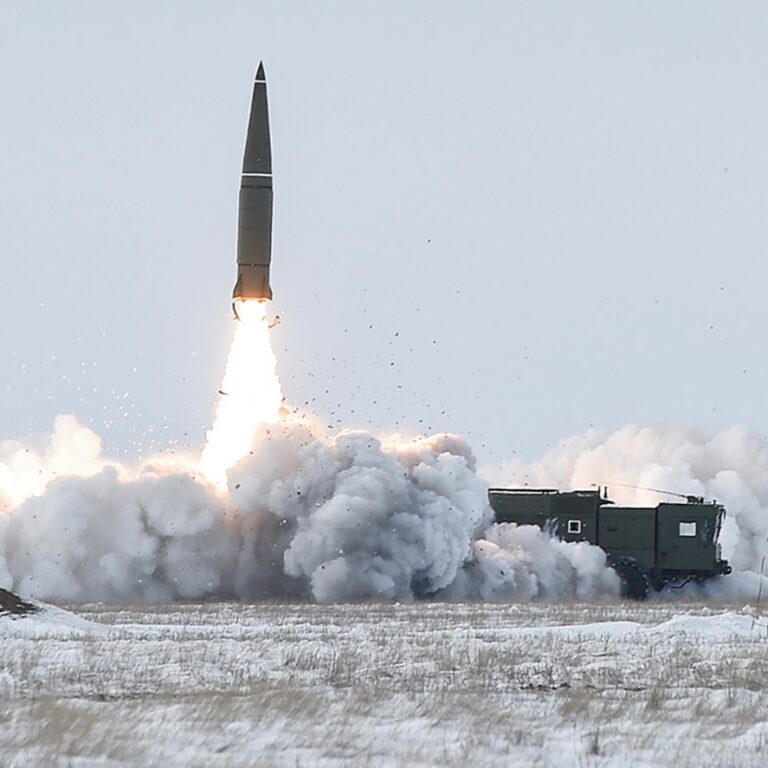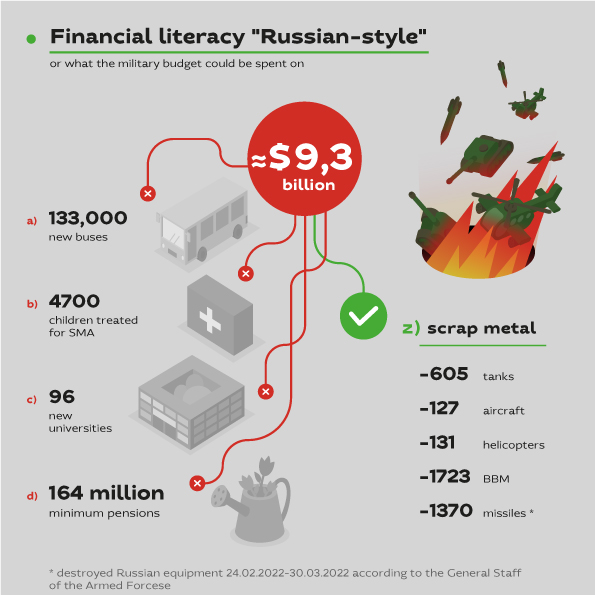
According to the General Staff of the Armed Forces of Ukraine, in more than one month of active hostilities, Russia has lost 4,417 units of various equipment, as well as more than 17,000 troops. The Pentagon states that as of March 29th, more than 1,370 missiles were fired on the territory of Ukraine. The number is constantly rising.
In the last 30 years, the Russian Federation has started numerous wars all around the globe. Nonetheless, the number of human casualties and technical losses is unprecedented. Every tank and helicopter that is damaged deprives the invaders of the opportunity to conduct combat operations and leads to significant financial losses.

At a rough estimate, Russia has lost 9.3 billion dollars in equipment, missiles, and military payments as of March 30th. This money could have been used for the development of military infrastructure or the defense of Russia. Instead, they were spent on the unprovoked war against Ukraine and the destruction of residential complexes, kindergartens, maternity hospitals, and the murder of civilian population. Judging by the constantly growing losses, it seems that one of the goals of the Russian army is to destroy as much of its own equipment and people as possible.

Of course, the funds spent on the armed aggression against the Ukrainian people could have been used for the improvement of living standards in Russia. Instead, the Russians’ “achievements” include economic sanctions, losses, and international isolation (cultural boycott included).

For instance, with the 9.3 billion dollars spent on the war, Russia could have paid 164 million minimum pensions. As a result, every pensioner in the country could receive four additional payments.
Ninety ix new universities across the country could be built, similar to the Sberbank Corporate University. Perhaps investing in education would help promote Russia and its educational institutions abroad. Instead, the war nullified the recognition of Russian diplomas at the international level.
This amount could also be invested in Elon Musk’s Space X partnership program or in the 157 Falcon 9 rocket launches. As a result, Roscosmos’s Dmitrii Rogozin could show that he’s productive at least somewhere other than his Twitter account. However, the launch of peaceful missiles for the development of society is by no means Russia’s vision of the future.

Instead of taking the lives of 148 Ukrainian children (as of March 30th), Russia could pay for the treatment of 4,675 children with diagnosed spinal muscular atrophy (SMA). Saving one life costs two million dollars, and almost always, families with this diagnosis are unable to raise such a sum on their own.
Also, with the money spent on the war, the Russians could build more than 16 thousand kilometers of new roads. This would allow to completely update the road surface on the Moscow — Yakutsk route. Or, perhaps, to pave a new road from the capital to some remote settlement in the so-called Russian hinterland. Maybe this money could be invested in the purchase of 133 thousand new passenger buses. This is not to mention how many jobs the construction of these roads or the purchase of the buses could provide.

Nine billion dollars is a rather significant sum for a state budget. This money could be invested in progress or at least spent on the needs of the population. However, Russia, accustomed to threatening everyone with war and canonizing the slogan “we can repeat” (referring to the victory in WWII), is willing to turn any money into scrap metal that will lie on Ukrainian roads and fields, into missiles that kill civilians, or into servicemen who will die every day while engaging in terrorism in a foreign country.

